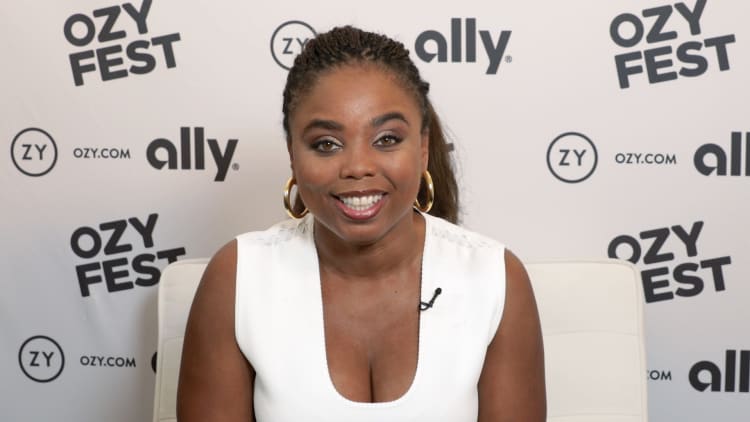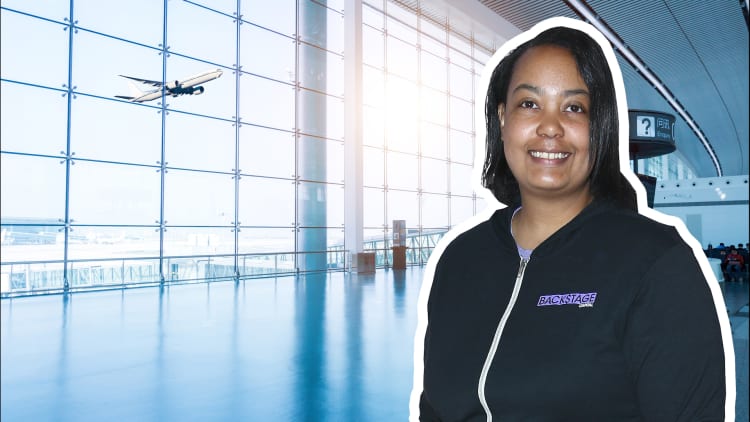Arlan Hamilton, 37, is the founder and managing partner of Backstage Capital, a venture capital firm that exclusively invests in companies founded by women, people of color and LGBTQ entrepreneurs.
Backstage's general fund manages more than $5 million of investments. In May, Backstage announced it was raising a $36 million seed fund dedicated exclusively to companies founded by black women. She expects the fund to invest $1 million into 15 - 20 companies over the next three years.
But just three years ago, Hamilton was homeless, living in the San Francisco airport. She had a backpack, a laptop and a dream of becoming the Robin Hood of venture capital. What she didn't have was money, a college diploma or a place to stay. "It was pretty traumatic to sleep on the floor of the airport and hope that that's not illegal, because I didn't know at the time," she tells CNBC Make It.
Here's how Hamilton went from homeless to running her own venture fund in just three years:
She kept learning
Hamilton grew up near Dallas, Texas. She started her first business in the 3rd grade, with the help of her mom. Hamilton's mother, who often travels with her today, would buy candy in bulk from Costco and Sam's Club, and Hamilton would sell each piece at a profit.
When she was 15, Hamilton got her first job as a cashier at Pudge Brothers Pizza. Throughout high school she worked her way up to assistant manager, graduated with honors and was voted "Most likely to succeed."
"I did really well in school, I just hated it," she says. "I wasn't allowed to really express myself, or ask questions beyond what was in the books, and I was always really curious. That followed me throughout my adulthood."
After high school, Hamilton pursued a career in the music industry, moving up from production assistant to tour manager for artists like Jason Derulo, Ceelo and Toni Braxton.
"In 2012, I had been on the road for a little bit and I was really achieving a lot of my dreams. Even though it was a lot of hard work and it was not glamorous, I was having a really good time," she recalls. "Around the same time, I started noticing different people like Ashton Kutcher and Troy Carter and Ellen [DeGeneres] who were all making investments in Silicon Valley."
Hamilton says she "got the bug." She quit her job in music, moved in with her mom in Texas and decided to put all of her time and effort towards learning more about venture capital. "To become a VC, most people go through four years of school, or get an MBA. I thought, 'I can figure that out,'" Hamilton tells Quartz. "So I just did that at home."
Hamilton taught herself about investing, practicing concepts on a whiteboard in her bedroom. "I read every single blog or book I could find. I watched hundreds of hours of video on YouTube." She read obsessively, tearing through books like "Venture Deals" by Brad Feld and Jason Mendelson. "They became sort of my professors at this four-year college that I created for myself," she says.
Hamilton realized that the industry leaders she was learning about didn't look like her, and the founders those investors were putting their money behind didn't look like the growing businesses she saw in her own community.
"I really didn't set out to become an investor, because I just — it just didn't seem realistic to me at the time, and it wasn't an interest until I understood that there were people who were not getting access to the same rooms as others," she says. "It just didn't seem right to me that most of the people that I knew who were starting companies were not straight white men ...and they were starting cool companies! Some of them were small businesses and some of them could affect the world, but they were not getting seen."

She asked for help
When Hamilton felt she had learned everything the could on her own, she set her sights on attending a two-week pilot course at Stanford University organized by early-stage venture fund and seed accelerator 500 Startups.
Still, she had no way to afford the tuition, fees or travel associated with taking the course. She was living with her mom, and at one point in time she remembers looking in her bank account and seeing just $12. That, she says, "was a good day. A positive bank account was rare."
To cover the cost of taking the course at Stanford, Hamilton spoke out on social media and was nominated for scholarship. Her vocal presence on Twitter caught the attention of people like Twitter, Uber and Instagram investor Chris Sacca, who helped her raise the rest of the funds she needed to get to California.
At Stanford she'd meet classmates and mentors who were millionaires and return each night to an Airbnb, unable to afford dinner. But the connections she made through the course would prove to be invaluable.
For months following the Stanford course, Hamilton stayed in San Francisco. Her savings dried up quickly, and when they did, she slept at the airport. "My mom actually would send me money like $10 at a time when she could put it together," Hamilton says of the days she spent sleeping at the airport. "She didn't have anything for me. And you know that probably the worst part was having her, you know, see me like that."
Hamilton would travel across Silicon Valley each day to meet with investors, founders and experts to talk about her vision, learn about the industry and build relationships with entrepreneurs she hoped to one day invest in. "I'd wake up every day and take a train either to Silicon Valley for meetings or up to San Francisco for meetings, and people were none the wiser."
Occasionally, Hamilton would borrow money from a family member in order to get a hotel room to "pull myself together for a night and feel human." One Silicon Valley connection she made was with Sam Altman, president of seed accelerator Y Combinator. Hamilton used LinkedIn to connect with his brother, Jack Altman, who forwarded her pitch along. Sam Altman didn't invest in Backstage, but he did give Hamilton a loan. She says that Altman sent her a text that said, "The world needs what you're doing and we've got to make it work for you."
"He actually gave me a loan and made it possible for me to live in Austin for a few weeks, so that I could just progress a little bit and not be so much in dire straits," she recalls. "He did that without anyone knowing or wanting anything in return, except to have the loan paid back at some point whenever I could."
Those funds bought Hamilton more time to pursue potential investors. She found her first one in tech-insider and angel investor Susan Kimberlain. "I met her at the Stanford course, because she was there to learn how to invest her family dollars in an impactful way," says Hamilton. "We spoke for a few months and September 15th, 2015, she said she was in."
Kimberlain wrote Hamilton a check for $25,000 and became Backstage's first investor.
She developed an investing philosophy
While Hamilton was not bashful about reaching out for help from Silicon Valley insiders, she did keep quiet about her struggles with her family, only telling her mother, her aunt and her brother of her ambitions and challenges. "I wasn't looking for pity party."
This mentality is central to Hamilton's investing philosophy. She believes that investing in companies founded by "underestimated" groups is going to make her, and her partners, rich.
"Of course it's impactful, of course it makes me feel good to do, but I'm really here to create generational wealth for myself, my family and for others," she says.
Just 0.2 percent of all venture capital goes to black women founders. "When we do get funding it's so minuscule. For every $1.2 million that a white man will get an in a seed round funding, a black woman gets $36,000, and what that really means is that that woman is expected to get as far and as fast," says Hamilton, citing 2016 figures from Project Diane, a biennial demographic study that provides a snapshot of the state of black women founders in the U.S.
Her philosophy was inspired by one of her biggest role models, Richard Branson, who she has followed since she was 15.
"He was definitely an outsider, he didn't come from affluent place, he had a hard time in school but he had this creativity that I really I really felt kinship with, because a lot of times I don't come across to people as 'Hey that's the next CEO of a company,'" says Hamilton. "I come across as 'She dresses weird' and 'She doesn't have that much money' and 'She didn't go to college' and all of those things. I just really like that he did things his way."
Hamilton believes that founders from groups who've been previously overlooked by venture capitalists could perform even better than other founders, were they to receive equal funding.
"I feel," she says, "that this will make me very very wealthy."
Like this story? Subscribe to CNBC Make It on YouTube!
Don't miss:




